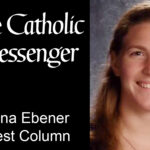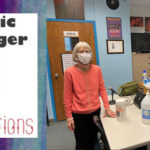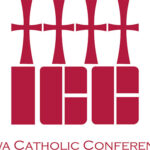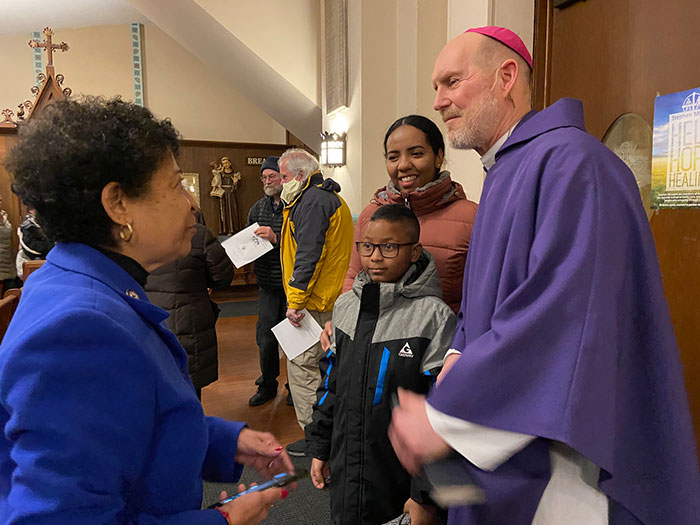
Bishop Thomas Zinkula visits with people after the Trilingual Farm and Food Workers Mass at St. Mary of the Visitation Church in Iowa City Dec. 16.
By Barb Arland-Fye
The Catholic Messenger
IOWA CITY — Hispanic, Congolese and Anglo Catholics celebrated unity within diversity during a Trilingual Farm and Food Workers Mass at St. Mary of the Visitation Church. Many who attended the liturgy Dec. 16 are immigrants, employed in essential jobs in hotels, restaurants, meatpacking plants, hospitals and other work places.
“We are Catholic with a big ‘C’ and we are catholic with a little ‘c,’ which means worldwide, universal,” Bishop Thomas Zinkula said in welcoming everyone to Mass. Father Guillermo Trevino, who is Hispanic, and Father Jeff Belger, who is Anglo, were concelebrants. Deacon Angel Hernandez, who is Hispanic, and Deacon Kent Ferris, who is Anglo, assisted. Father Denis Hatungimana, an African priest who serves the French community, planned to concelebrate but was unable to make it due to illness. The liturgy included English, French and Spanish languages. Perry Makumi of the Congolese community read the French parts.
The liturgy and meal that followed provided spiritual grounding for the launch of a new pandemic relief program and blended cultural traditions on the first night of “las posadas.” This Hispanic tradition recounts the story in song of Mary and Joseph’s difficult journey to find shelter where Mary could give birth to the baby Jesus. Hispanic Catholics retell the story each night for nine consecutive nights, symbolizing the nine months of Mary’s pregnancy.
Inn keepers’ rejection of Mary and Joseph figured into Bishop Zinkula’s homily on welcoming the foreigner and embracing unity within diversity. He wove an allegory into a call for action, telling a story about a young fugitive who sought refuge in a small village that initially accepted and then rejected him, failing to recognize the savior in their midst.
Fearful of the threat against their own lives by soldiers pursuing the fugitive, the villagers laid the fate of the young man’s life on their minister. Poring over his Bible for hours searching for an answer, the minister read this passage: “It is better that one man dies than that the whole people be lost.” The minister revealed the whereabouts of the fugitive, who was taken away to be tortured and executed.
The villages celebrated their survival but the anguished minister could not. That night an angel came to him, questioned his actions and told the minister, “That man was sent by God to be the savior of this country. And you handed him over to be tortured and killed.” The minister asked how he could have known. The angel said, “If you had visited this young man just once and looked into his eyes, you would have known.”
Look into their eyes
Reflecting on the first reading from Isaiah, Bishop Zinkula noted that the blessed are those who do what is right, what is just, and who welcome foreigners desiring to join themselves to the Lord. Isaiah, conveying the Lord’s message, says, “… my house shall be a house of prayer for all peoples.”
Bishop Zinkula asked the gathering, “Whose eyes do you and I need to look into more deeply? Whose eyes are we perhaps afraid to look into because we might see Jesus and we want to see, instead, an outsider, a foreigner? After Jesus was born, Herod wanted to kill him because he viewed him as a rival king. He was unwilling to look into the eyes of a newborn and see instead a savior. So Joseph and Mary had to flee with their infant son as refugees to Egypt. They were, in effect, undocumented immigrants.”
“Tonight is the first night of las posadas. May the posada teach us empathy for the poor, the stranger and the migrant.” He referenced a statement that Bishop Mark Seitz, chair of the U.S. bishops’
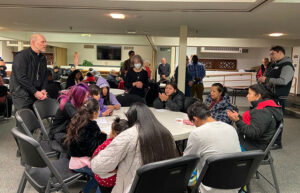
Bishop Thomas Zinkula prays with families before a meal that followed the trilingual Mass Dec. 16 at St. Mary of the Visitation Parish in Iowa City.
Committee on Migration, made on the feast of Our Lady of Guadalupe (Dec. 12). Bishop Seitz said that during this Advent season, immigrants are “‘visible signs of Christ among us.’ If we look into the eyes of immigrants and see Christ, we will call on federal authorities to make structural improvements to our broken immigration system.”
“When we speak about the issue of immigration,” Bishop Seitz said, “we are fundamentally addressing the movement of people — human persons created in the image and likeness of God, each of them a brother or sister to all. … Our Lady of Guadalupe points us towards a better way.”
Bishop Zinkula concluded, “May we be inspired by Isaiah, the Holy Spirit, the Eucharist, Our Lady of Guadalupe, las posadas and Bishop Seitz to broaden our vision and open our minds and hearts to those around us who have been sent by God. They will save us if we but look into their eyes and see Jesus.”
Clinton Dimambu, an immigrant from the Democratic Republic of Congo, described Bishop Zinkula’s homily as powerful. He also praised Iowa City Catholic Worker for organizing the Mass on behalf of essential workers. “When someone is working hard, you have to pay him a good salary to take care of his family,” Dimambu said.
“We wanted to have a trilingual Mass to prepare ourselves spiritually before the launch of the big Food and Farmworker Relief Program,” said David Goodner, co-founder of the Iowa City Catholic Worker. Escucha Mi Voz, an advocacy group, and Iowa City Catholic Worker are recipients of a grant Catholic Charities USA received from the U.S. Department of Agriculture. It will provide $600 relief checks to more than 1,800 qualifying meatpacking plant workers, grocery workers and farm workers in eastern Iowa who incurred out-of-pocket expenses during the COVID-19 pandemic.
As he surveyed the parish hall, where Hispanic, Congolese and Anglo Catholics enjoyed a meal incorporating foods from each culture, Goodner expressed gratitude for the turnout. Iowa City Catholic Worker strives to provide immigrant and refugee families with safe and stable housing while they work to rebuild their lives in Iowa. The two Iowa City Catholic Worker houses are home to 28 immigrants. “If we had the Mass at the Catholic Worker it would have been a little cramped.”
Faith in Action
“It’s fun to get the communities together,” said Emily Sinnwell, during a break from filling plates with tamales, a traditional Hispanic food, and “fufu,” an African dish that resembles a small loaf of bread, accompanied by meat sauce. “It’s nice to be able to put Bishop Zinkula’s homily into action. There is a sense of relief in knowing that your work is supported by the Church.”
Maria Mellado, a member of St. Alphonsus Parish in Mount Pleasant, appreciated the celebration of diversity, with a variety of languages, the bishop and clergy, and a re-enactment of las posadas. Ninoska Campos, who emigrated from Honduras, described the Mass as “really beautiful. It was for the workers, it was for everyone,” she said, through an interpreter. Campos is one of the main organizers of Escucha Mi Voz, which Iowa City Catholic Worker and Quad Cities Interfaith helped launch in the midst of the pandemic to advocate on behalf of essential workers.
Claire Lewandowski, a middle school teacher from Wisconsin who is taking a pause from teaching, serves as an organizer for Escucha Mi Voz and lives in one of the Iowa City Catholic Worker
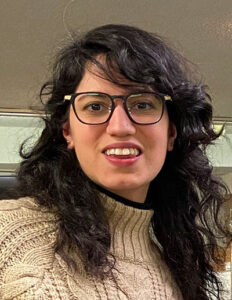
houses. “I wanted to be in service in other ways that used my gifts, my abilities. I feel that teaching and organizing are interrelated; it is about seeing the best in everyone. So much of organizing is building relationships and so is teaching,” said Lewandowski, whose mother is from Ecuador.
Lewandowski appreciated Bishop Zinkula’s homily, which connected faith with the public square. “We as Catholics have to examine our consciences and the Church has to examine its own conscience. It was refreshing to hear a bishop to say something like, we need immigration reform.”









